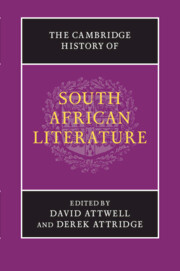Book contents
- Frontmatter
- Introduction
- PART I ORATURES, ORAL HISTORIES, ORIGINS
- 1 ‘The Bushmen's Letters’: |Xam narratives of the Bleek and Lloyd Collection and their afterlives
- 2 A contextual analysis of Xhosa iimbongi and their izibongo
- 3 ‘I sing of the woes of my travels’: the lifela of Lesotho
- 4 Praise, politics, performance: from Zulu izibongo to the Zionists
- 5 IsiNdebele, siSwati, Northern Sotho, Tshivenda and Xitsonga oral culture
- PART II EXPLORATION, EARLY MODERNITY AND ENLIGHTENMENT AT THE CAPE, 1488–1820
- PART III EMPIRE, RESISTANCE AND NATIONAL BEGINNINGS, 1820–1910
- PART IV MODERNISM AND TRANSNATIONAL CULTURE, 1910–1948
- PART V APARTHEID AND ITS AFTERMATH, 1948 TO THE PRESENT
- PART VI SOUTH AFRICAN LITERATURE: CONTINUITIES AND CONTRASTS
- Index
- References
2 - A contextual analysis of Xhosa iimbongi and their izibongo
from PART I - ORATURES, ORAL HISTORIES, ORIGINS
Published online by Cambridge University Press: 28 January 2012
- Frontmatter
- Introduction
- PART I ORATURES, ORAL HISTORIES, ORIGINS
- 1 ‘The Bushmen's Letters’: |Xam narratives of the Bleek and Lloyd Collection and their afterlives
- 2 A contextual analysis of Xhosa iimbongi and their izibongo
- 3 ‘I sing of the woes of my travels’: the lifela of Lesotho
- 4 Praise, politics, performance: from Zulu izibongo to the Zionists
- 5 IsiNdebele, siSwati, Northern Sotho, Tshivenda and Xitsonga oral culture
- PART II EXPLORATION, EARLY MODERNITY AND ENLIGHTENMENT AT THE CAPE, 1488–1820
- PART III EMPIRE, RESISTANCE AND NATIONAL BEGINNINGS, 1820–1910
- PART IV MODERNISM AND TRANSNATIONAL CULTURE, 1910–1948
- PART V APARTHEID AND ITS AFTERMATH, 1948 TO THE PRESENT
- PART VI SOUTH AFRICAN LITERATURE: CONTINUITIES AND CONTRASTS
- Index
- References
Summary
Southern African oral literature
Southern African oral literature has conventionally been grouped into three primary genres: oral poetry (praise poems and songs); narrativematerial (folktales, myths, legends, fables); and wisdom-lore (idioms, riddles and proverbs) (Lestrade, ‘Domestic and Communal Life’). An analysis of these various genres and how they relate to aspects of modern-day African existence such as music, gender, medicine, theatre, cinema, religion, politics and history can be found in my edited work, African Oral Literature (2001). This chapter begins by outlining some of the most important early works in the narrative genre of the folk-tale and then moves on to oral poetry, the main focus of this chapter.
A number of seminal works over the years have emphasised the importance of southern African oral literature and offered different approaches to analysis. A few of these dealing with the folk-tale in southern Africa are contained in my edited work, Foundations in Southern African Oral Literature (1993). Collected in that volume is a broad-based essay dating from 1930 by G. H. Franz, which deals generally with the preliterary period as well as the development of modern written literature in Lesotho. Franz looks at oral poetry, lithoko, as well as folktales, litsomo. He traces the development of Christian and school literature and includes a valuable analysis of writings concerning folklore and custom. In the same volume, P. D. Cole-Beuchat (1958) provides a contextualised analysis of various oral literary genres (riddles, folk-tales and proverbs) among the Tsonga-Ronga peoples.
- Type
- Chapter
- Information
- The Cambridge History of South African Literature , pp. 42 - 59Publisher: Cambridge University PressPrint publication year: 2012
References
- 2
- Cited by

